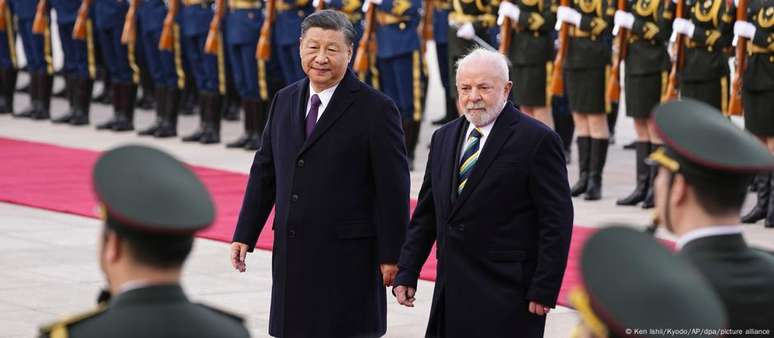Lula meets Xi Jinping with a big underlying question: will Brazil join the Belt and Road? The expert highlights the hesitations of Itamaraty, who seeks to maintain non-alignment in the dispute between China and the United States Brazilian President Luiz Inácio Lula da Silva will receive the Chinese President this Wednesday (11/20) in Brasilia. , Xi Jinping, with a large The bottom line is: Will Brazil accept the invitation to join China’s global infrastructure investment initiative, Belt and Road, also known as the “New Silk Road”?
China has every interest because it sees the possible entry of Brazil as a seal of approval of its international project towards the countries of South America. But the Brazilian government is divided on the issue and Itamaraty has expressed reservations.
Ana Tereza Marra, professor of international relations at the ABC Federal University and expert on China at the Observatory of Foreign Policy and International Integration of Brazil (Opeb), explains to DW that Brazilian diplomacy believes that relations with China are already quite fruitful. And that Brazil’s membership of the Belt and Road would bring more symbolic than practical advantages – symbolism which could, on the other hand, affect the equidistance with the other global power, the United States.
China is Brazil’s first trading partner and the United States its second. And Brazil “should not choose either side, it should maintain a position of equidistance and non-alignment, and try to take advantage of and have good relations with both countries,” Marra says.
But there are also sectors of the government that see the Belt and Road as an opportunity to try to negotiate with China greater investments in Brazilian infrastructure and industry, which could contribute to the neo-industrialization pursued by Lula. “If Brazil was clear about what it wants to obtain from this relationship and the projects it wants to propose, it could be advantageous,” says Marra, who does not consider a possible Belt and Road entry synonymous with alignment with Beijing.
He also predicts that the new Donald Trump administration will increase pressure on Brazil to contain China’s expansion – as happened in his first term with the choice of the 5G telephone network – but says that the country will be able to sustain its position of not alignment.
DW: What is the current picture of relations between Brazil and China?
Ana Tereza Marra: Brazil is currently trying to improve the political and economic quality of relations with China. Since 2009, China has been Brazil’s largest trading partner, and Brazil is one of the countries in the world with the largest surplus against China. This economic achievement was important for Brazil.
On the other hand, it is a very asymmetric commercial relationship, which has an impact on the deindustrialization process in Brazil. The Lula government’s goal is to promote neoindustrialization and it sees China as a possible partner that can contribute to this.
But how can we imagine China participating in the reindustrialization of Brazil, if it is interested in exporting its industrialized products to Brazilians?
This is the discussion of the last two years – thinking about industrial, infrastructure-related projects that countries can jointly implement and help in the process of domestic industrialization.
It is obvious that this is another issue related to Brazil’s internal capacity and the projects to propose, not only to China, but also to other countries. But Brazil believes that it is important for China, in geopolitical terms, to strengthen the multipolar world.
We read that, for China, this is important [os países da] South America, and Brazil which is its main country, are being strengthened so that they can act as an autonomous hub and have strategic autonomy with respect to the pressure that the United States exerts to contain China. This political will is perceived, let’s see how it will be put into practice and whether it will produce results.
China has increased investment in Brazil not only in the sectors in which it traditionally invested, such as energy, but also in the industrial and manufacturing sectors. Then we need to think about how these investments can help Brazil position itself in the value chains and create an internal network of suppliers that can contribute to this industrial development.
Has the recent Brics expansion affected Brazil’s relations with China?
Brazil did not want the expansion of BRICS, it believed that this would dilute the country’s power within the group. And I think Brazil is not yet completely comfortable with the enlarged group.
This is a group that still has an uncertain identity, but which is interpreted in the so-called West as a group that has become increasingly anti-Western. And Brazil’s perspective on the Brics has always been to consider them as an element to strengthen the multipolar world and the quest for development of the poorest countries, which would help Brazil to propose agendas of Brazilian interest.
Having said that, I think that relations between Brazil and China are now mature enough to be able to create disagreements, such as the one that occurred over the expansion of the Brics, and to compartmentalize things. The Brics are one thing, Brazil-China relations are another.
In the geopolitical conflict between the United States and China, what kind of foreign policy should Brazil adopt?
Brazil should not choose either side, it should maintain a position of equidistance and non-alignment and try to take advantage of it and have good relations with both countries.
China is Brazil’s first trading partner and the United States is its second. In terms of political relations and historical ties, the United States is a country at the center of Brazilian foreign policy.
Of course, this strategy can become increasingly difficult over time. Now we have Trump as president of the United States again. The last time he was president, he pressured Latin America to adopt a containment strategy against China, much more than the Biden administration did, including in the discussion of the role of Chinese technology companies in the 5G network. It exerts more pressure, and more pressure can make equidistance difficult.
But Brazil is capable of supporting this position. The traditional position of Brazilian foreign policy is that of non-alignment. Generally, periods of alignment are explained by moments in which executive figures, for various reasons, end up overlapping with Itamaraty’s traditional position.
Regarding the Belt and Road Initiative [Belt and Road Initiative]What is China’s interest in attracting Brazil’s membership?
China today has a great interest in increasingly legitimizing its international activities, in being perceived as an internationally responsible country that contributes to the development of other countries. And for this, Belt and Road is one of the main pillars.
More than 150 countries participate in this initiative. But China wants to attract more important countries, and Brazil is seen as one of these very important countries, which would help legitimize this project, not only for countries in the Global South, but also for countries in the region. Brazil’s entry is seen as a sort of seal of approval for this Chinese project.
Would joining the initiative bring more advantages or disadvantages for Brazil?
There is some hesitation in entering into this project, especially on the part of Itamaraty, who has some considerations. The first is to think about what Brazil’s entry into the Belt and Road would add to Brazil-China relations. The assessment is that, in political terms, relations between Brazil and China are already sufficiently mature, and Brazil already has important trade relations with China and receives more and more Chinese investments.
The question then arises: what would Belt and Road add to all this? The impression of some is that not much would change, that it would be a symbolic entry and that diplomatically it would not make much sense from the Brazilian point of view.
The second point of hesitation is that Itamaraty has a position of non-alignment, of trying to maintain distance in this conflict between China and the United States. Although I personally don’t think that Brazil’s joining the Belt and Road means an alignment with China. There are more than 150 countries on the Belt and Road, it is impossible to say that they are aligned with China.
On the other hand, there are actors within the government who are in favor, who want Brazil to exploit the opportunity of the Belt and Road to try to negotiate greater investments in infrastructure and industry with China, with the prospect of a national development plan. In particular, I think that if Brazil could be clear about what it wants to obtain from this relationship and what projects it wants to propose, it could be advantageous.
Another thing is that joining the Belt and Road ultimately means signing a memorandum of understanding. It is not something that means changing internal policies, adhering to formally binding instruments. It is quite flexible and can be negotiated, so that projects of mutual interest can be presented.
Source: Terra
Rose James is a Gossipify movie and series reviewer known for her in-depth analysis and unique perspective on the latest releases. With a background in film studies, she provides engaging and informative reviews, and keeps readers up to date with industry trends and emerging talents.







